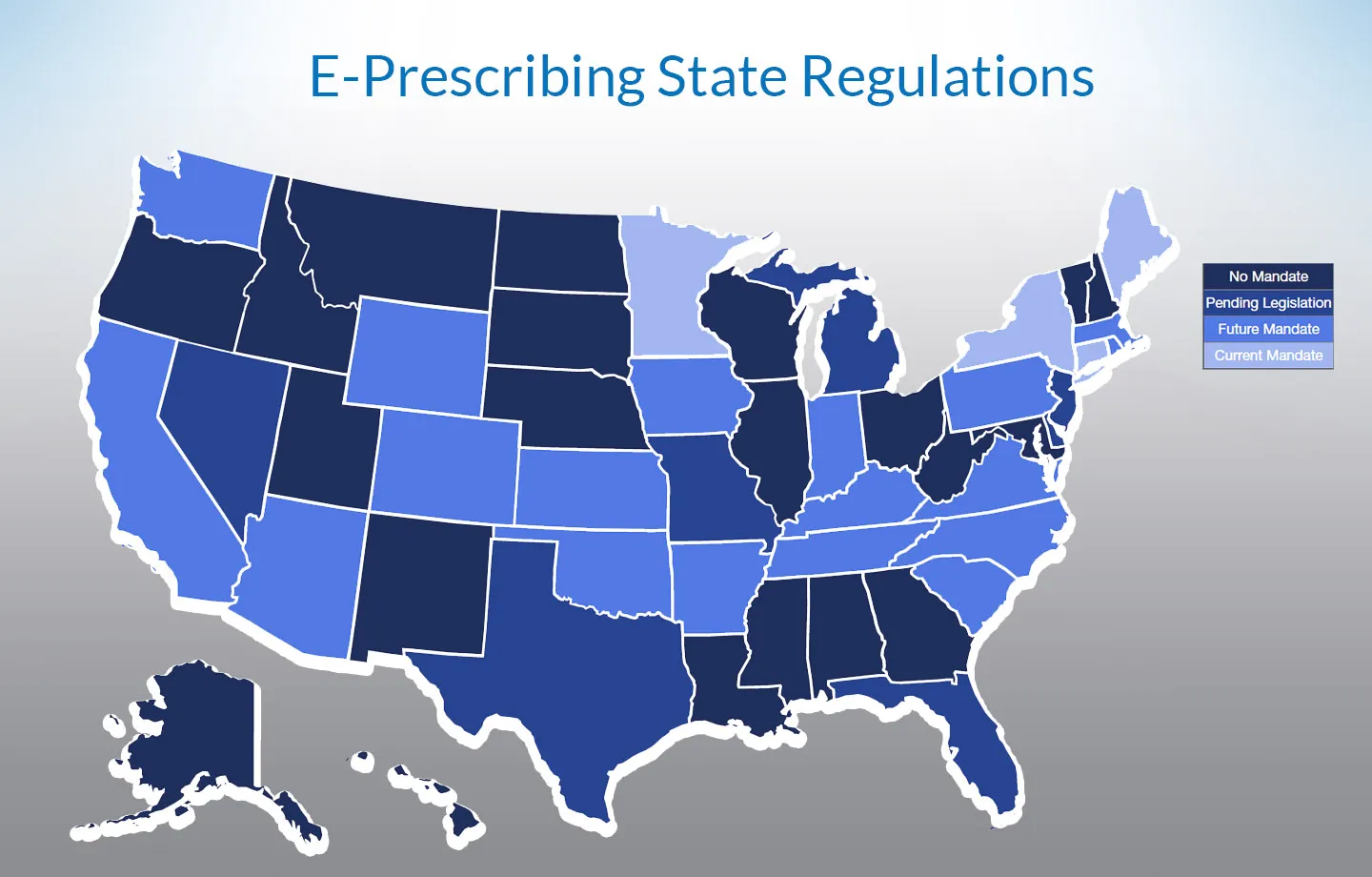Modern medical practices demand more than clinical expertise. They require efficient systems that optimize the workflow and keep a minimum workload for the doctors. This helps the physicians to focus more on their...

Laws requiring e-prescribing are gaining momentum nationwide. Many states have already passed mandates on e-prescribing and many others are introducing legislation that will take effect within the next few years.
Are you familiar with the laws on e-prescribing in your state? Each state has an individual approach, so mandates vary from state to state. Review our outline below for more information on e-prescribing laws in your state and remember, e-prescribing under Medicare Part D will most likely be required for all prescribers come 2021.
States who have current laws in place are:
- Connecticut - e-prescribing for controlled substances
- Maine - controlled substances containing opiates
- Minnesota - all prescriptions
- New York - all prescriptions
States who passed laws that will be going into effect soon are:
- Arizona - controlled substances, effective 2020
- Arkansas - Schedule II-VI controlled substances, effective 2021
- California - all prescriptions, effective 2022
- Colorado - Schedule II-IV controlled substances, effective July 2021 for most prescribers or July 2023 for dentists and rural or solo practitioners
- Indiana - controlled substances, effective 2021
- Iowa - all prescriptions, effective 2020
- Kansas - controlled substances containing opiates, effective 2021
- Kentucky - controlled substances, effective 2021
- Massachuttes - controlled substances, effective 2020
- North Carolina - Schedule II and III controlled substances, effective 2020
- Oklahoma - Schedule II-V controlled substances, effective 2020
- Pennsylvania - Schedule II-V controlled substances, effective October 24, 2019
- Rhode Island - controlled substances, effective 2020
- South Carolina - controlled substances, effective 2021
- Tennessee - controlled substances, effective 2021
- Virginia - controlled substances containing opiates, effective July 2020
- Washington - controlled substances, effective 2021
- Wyoming - controlled substances, effective 2021
States with pending legislation on e-prescribing are:
- Delaware
- Florida
- Michigan
- Missouri
- Nevada
- New Jersey
- Texas
Is your practice ready for e-prescribing requirements? As more states begin to mandate e-prescribing, now is a good time to ensure your practice is ready. E-prescribing also has many advantages, such as safer, more accurate, prescribing and lower-costs.
Ready to learn more? Talk to a member of our team about e-prescribing with Practice EHR. Request a demo to learn more about our EPCS-certified software today.
Topics: Integrated EHR, Patient Care, Small Practice, E-Prescribing
RECENT POSTS



TOPICS
- EHR Solution (193)
- EHR (127)
- digital age (120)
- Patient Care (117)
- Medical Billing (112)
- Specialty-Specific EHR (112)
- Industry Update (98)
- Technology in Healthcare (84)
- EHR Features (79)
- Small Practice (78)
- Medical billing services (74)
- Integrated EHR (64)
- RCM (64)
- HIPAA Security (62)
- Cloud-based EHR (44)
- New Technology (44)
- Telemedicine (44)
- Healthcare Office Management (40)
- Practice EHR News (38)
- Kiosk (31)
- Revenue Cycle Management (28)
- AI Solutions (26)
- ePrescribing (21)
- AI Scribing (17)
- Best EHR Software (17)
- Practice Management Software (13)
- AI EHR (12)
- AI-powered Medical Billing (12)
- EMR (12)
- TeleVisit (12)
- AI Scribe (11)
- Practice Automation (11)
- Client Favorites (10)
- The ONE (10)
- AI scanning (9)
- Switching to New EHR (9)
- Urgent Care (9)
- Best EHR Practice (8)
- EHR Integration (8)
- MACRA/MIPS (8)
- Patient Portal (8)
- Psychiatry EHR (8)
- Medical Practice Management Software (7)
- Automated Health Tools (6)
- E-Prescribing (6)
- Product Updates (6)
- events (6)
- MIPS (5)
- Mobile EHR (5)
- Telehealth Platforms (5)
- Family Medicine EHR (4)
- HIPAA (4)
- Insider (4)
- Integrated Practice Management (4)
- Internal Medicine EHR (4)
- MIPS Reporting (4)
- Multilingual AI Scribe (4)
- Orthopedics EHR (4)
- Podiatry (4)
- Podiatry EHR (4)
- Regulatory Updates (4)
- Telehealth Platform (4)
- Automated EHR (3)
- Chiropractic EHR (3)
- Digital Experiences (3)
- EHR Flaws (3)
- EHR Implementation (3)
- EHR for Chiropractors (3)
- EHR for Small Practices (3)
- Eligibility Verification in Medical Billing (3)
- Medical Coding Services (3)
- Patient Check-in Kiosk (3)
- PracticeEHR GO App (3)
- AI Scan (2)
- Cash Flow (2)
- Cashless Payments (2)
- Clearinghouse (2)
- Dermatology EHR (2)
- EHR Scheduling (2)
- Family Medicine (2)
- Foot and Ankle Care (2)
- Foot and Ankle EHR (2)
- Health records 101 (2)
- Healthcare Compliance Certification (2)
- Medical Billing Partner (2)
- Medical Credentialing (2)
- Pediatrics EHR (2)
- Quality of Patient Care (2)
- Reporting Under MIPS (2)
- Risk and Liability in Medical Settings (2)
- Voice-Activated AI Scribe (2)
- What Works Clearinghouse (2)
- ACA Subsidy (1)
- AI Scribe for Pediatric Care (1)
- Bariatric EHR (1)
- Behavioral Health Practices (1)
- Billing Communication (1)
- Billing for Private Practices (1)
- Cardiology EHR (1)
- Charting (1)
- Data Security (1)
- Dos and Don'ts (1)
- EHR Dashboard (1)
- EHR Guides (1)
- EHR KPIs (1)
- EHR Questions to Ask (1)
- EHR Transition (1)
- EHR for Chronic Illness (1)
- EMR vs EHR Difference (1)
- ENT EHR (1)
- Endocrinology EHR (1)
- Gastroenterology (1)
- Gastroenterology EHR (1)
- General Surgery EHR (1)
- Geriatric AI scribe (1)
- Geriatrics EHR (1)
- Guides (1)
- Healthcare Practice Office Management (1)
- Help Center Videos (1)
- Insurance Reimbursement (1)
- KPI (1)
- Key Performance Indicators (1)
- Lab Processing (1)
- MACRA (1)
- Nephrology EHR (1)
- Neurology EHR (1)
- Pain Management EHR (1)
- Patient Behavior (1)
- Pediatric Care (1)
- Physical Therapy EHR (1)
- Practice Cash Flow (1)
- Practice Efficiency (1)
- Pulmonology EHR (1)
- Reconsider Your EHR (1)
- Simplify Practice Management (1)
- Staffing in Healthcare (1)
- Switch Medical Billing Providers (1)
- Urgent Care Medical Billing (1)
- Urology EHR (1)
- insurance claim denials (1)









